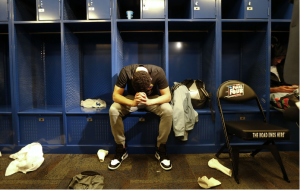By Erin Baker, Masters of Education Student, BU Wheelock, Counseling & Sport Psychology Program
Athlete. On paper this appears to be a seven-letter word, but what is not illustrated are the thousands of training hours required to earn this title. With so much time and energy spent on becoming an “athlete”, this title not only stands for what these individuals are, but it becomes a key piece of who they are as well. Unfortunately, even the most elite athletes will not maintain an athletic career for the entirety of their lifetime, which means sport psychologists, coaches, and other stakeholders must be aware of the nuances of athlete identity, and how to navigate them as athletes prepare to transition from sport (Hansen et al, 2019).
Understanding the Athletic Identity
Identity is built off of one’s self-perception of their physical, psychological and interpersonal characteristics – many of which are rooted in personal experiences, memories, and social influences. Since athletes have spent much of their lives training, earning recognition for athletic accomplishments, and being integrated in the sport environment; they experience their athletic identity as most salient piece of who they are (Menke & Germany, 2019).
While early experiences may have influenced the significance of the athletic identity, sociologists believe it is the athlete’s interaction and response to their external environment which causes this identity to be their primary focus. Picture an actor interacting with their audience, putting on a façade as they transform into who the audience wants to see at that moment – this is the same thing that happens with athletes. When an athlete’s external environment is constantly sport-related they are always rearranging their identity so that “athlete” is at the forefront – making it seem as if this is their sole identity. However, it is believed that when the sport-related stimuli are removed, athletes will rearrange their identity and adapt themselves to fit into the new external environment. This proposed idea of identity adaptation offers a promising outlook as it suggests that athletes have a range of other identities outside of sport — the key is for sport psychologists to empower athletes to explore and access these other identities so when it is time for them to transition, they will not find themselves in a state of crisis (Hickey & Roderick, 2017).
Practical Application
Encourage Non-Sport Activities
Athletes should be encouraged by coaches, sport psychologists and other stakeholders to engage in non-sport related activities. Participating in outside activities will expose athletes to other social environments in which they can display and try on their other identities – preventing them from foreclosing on a single identity: athlete (Menke & Germany, 2019).
Normalizing Negative Emotions
Stakeholders should not only be encouraging athletes to engage in outside activities, but they should also have conversations with athletes about the psychological impacts of sport transition. When athletes transition out of sport they often face a significant sense of loss, grief, and other negative emotions. These negative psychological responses can feel isolating if athletes think they are the only ones experiencing them. However, if athletic personnel have conversations with their teams about the potential for these negative reactions, sharing their own personal experiences with transition, it can help normalize this experience – showing athletes that they are not alone and validating their emotional response (Menke & Germany, 2019).
Putting it All Together
Athletes anticipating transition often benefit from a multifaceted educational program as well. Such programming may focus on identity, career transition, and adapting to major life change (transition). Programs should include workshop elements that teach different coping strategies to improve athlete resilience. It is also important that programs feature a balance of psychoeducational and experiential learning components so that athletes are not only learning about the important information, but engaging in reflective practices and activities that they can continue to use even after the program ends (Hansen et al, 2019).
Take Home Message
When athletes feel like their sport-related identity has become the most salient to them they are more likely to face challenges when it comes time to transition. Therefore, sport psychologists, coaches, and other stakeholders need to create an environment conducive to identity exploration, as well as a safe space to discuss mental health challenges and personal concerns with the upcoming transition process (Hickey & Roderick, 2017). There are many professional athletes who have recognized the need for spaces like this, and have created organizations like the Positive Coaching Alliance (PCA) to help facilitate a healthy transition for athletes. In this video, former U.S. Women’s National Team Member, Danielle Slaton talks about the impact of her transition out of sport, and how she has partnered with the PCA in hopes of empowering athletes to change their mindset and learn how to view transition as not a detriment, but an opportunity (“Connect with PCA”, n.d.). Programs like these are necessary for sport psychologists to implement in order to mitigate the athlete identity crisis that ensues with career transition.
References
[Digital image]. (n.d.). Retreived from http://undefeatedsportpsych.com/athlete-identity-loss-retirement/
Hansen, A., Perry, J., Ross, M., & Montgomery, T. (2019). Facilitating a successful transition out of sport: introduction of a collegiate student-athlete workshop. Journal of Sport Psychology in Action, 10(1): 1-9. https://doi.org/10.1080/21520704.2018.1463329
Hickey, C., & Roderick, M. (2017). The presentation of possible selves in everyday life: The management of identity among transitioning professional athletes. Sociology of Sport Journal, 24(3):270-80. https://doi.org/10.1123/ssj.2017-0018
Menke, D., & Germany, M. (2019). Reconstructing athletic identity: College athletes and sport retirement. Journal of Loss and Trauma, 24(1): 17-30. https://doi.org/10.1080/15325024.2018.1522475
Positive Coaching Alliance. (n.d.). Connect with PCA. Retrieved November 22, 2020, https://positivecoach.org/bring-pca-to-your-school-or-league/.
Positive Coaching Alliance. (2015, September 1). An athlete’s transition to the “real” world [Video]. YouTube. https://www.youtube.com/watch?v=gs6eViTlMv4&feature=emb_logo
